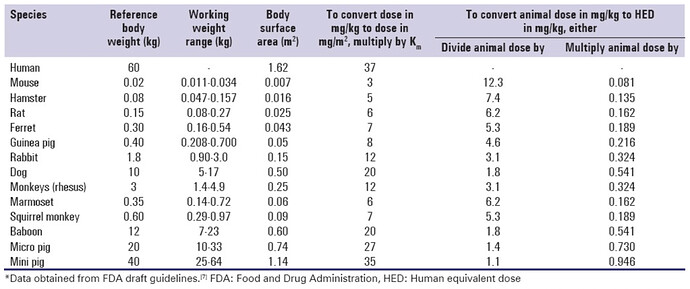Are there any animal, yeast, or nematode studies showing a dose response for longevity to rapamycin? I’m wondering whether any studies would suggest a benefit from taking low doses, such as 1mg or 2mg once a week.
A significant portion of the benefit of rapamycin is thought to mimic caloric restriction, so I suspect that just as “eating less” of a high quality diet is likely to increase health and longevity at some level for most people, taking a low dose or rapamycin seems like it will provide some benefit for most people.
We have list of all the mouse rapamycin studies and dosing here: List of all the Mouse Studies Showing Rapamycin Lifespan Extension
Also - just to give you some tools to evaluate the different dosing levels in the aforementioned mouse studies, see calculations below:
From this document:
I think daily dosing in mice is roughly equivalent to about once every 4 days or so in human terms given the speed that mice metabolize rapamycin is about 4 times faster.
| Sirolimus Dose |
Mouse mg/kg/day Dose |
Mouse: Blood/Sirolimus Level |
Human mg/kg/day Dose |
Dose for 60kg Human | Daily Dose adjusted for longer half-life (/4) |
|---|---|---|---|---|---|
| 4.7ppm | ∼2.24 | 3 to 4 ng/mL | 0.182 mg/kg | 10.92 mg | 2.73 mg |
| 14ppm | ~6.67 | 9-16 ng/mL | 0.542 mg/kg | 32.54 mg | 8.135 mg |
| 42ppm | ~20 | 23-80 ng/mL | 1.626 mg/kg | 97.56 mg | 24.39 mg |
| 126ppm | ~60 | 4.878 mg/kg | 292.68 mg | 73.17 mg | |
| 378ppm | ~180 | 45 to 1800 ng/mL | 14.634 mg/kg | 878.04 mg | 218 mg |
| Sirolimus Dose |
mg/kg/day Dose |
Blood/Sirolimus Level |
Male Median LS Increase | Female Median LS Increase | |
| 4.7ppm | ∼2.24 | 3 to 4 ng/mL | 3% | 16% | |
| 14ppm | ~6.67 | 9-16 ng/mL | 13% | 21% | |
| 42ppm | ~20 | 23-80 ng/mL | 23% | 26% |
Based on the FDA animal to human dosing conversion guide here.
Note: ½ life for sirolimus in mice is approx. 15 hours, vs. approx. 62 hours in humans. So, mice metabolize sirolimus approximately 4 times faster than humans.
It looks like male mice need 3x dose, until I guess some very high dose equilibrium, to achieve the same life extension benefits as female mice. It would be good to keep track of insights into this. Humans are of course not mice, but still interesting and findings may be applicable.
Thanks for compiling all that data!
Based on this data, would a man taking 2mg every four days extend life by 3%, 8mg every four days by 13%, and 24mg every four days by 23%?
It’s unclear whether there is a dose-response difference in humans. The mice were fed a specially comfounded food-rapamycin mixture that may explain the difference in blood levels between genders that, as far as I am aware of, are not existant in humans who take rapamycin pills orally.
As Virilius mentioned, we don’t see that rapamycin dose/response difference in male and female humans, that they see in mice. So in humans we see the same blood levels of rapamycin for the same dose.
Most scientists I’ve spoken to think that most longevity drugs are not going to have as large an effect in humans (that live 80+ years) as it does in a mouse that lives 3 years. But since nobody has any done any good studies in humans with longevity drugs (measuring / tracking effects on aging) we just don’t know.
Most scientists who are in the longevity / aging biology field seem to think rapamycin will provide a boost of 5 to 10 years (if started mid-life, current dosing standards around 6mg/week), and some think much longer. See here: 80% of Longevity Experts Predict Significant Benefits for Rapamycin in Humans
What about short-term rapamycin vs. continuous treatment? Are you familiar with how using rapamycin short-term compares to continuous treatment in mice? I wonder if taking rapamycin for a short period might have similar benefits to taking it continuously.
There are some studies of rapamycin use “short-term” of extremely high dose in mice (for example 3 months dosing then stop) and they’ve had success in lifespan improvement. In fact I’ve information in the table above (the dosing of 126 and 378ppm above). The issue is that the dose is extremely high (equivalent to 73mg to 218mg per DAY) in humans. So it doesn’t translate well unless you want to live in a bubble (i.e. live like lab mice in a pathogen free environment and breath only super clean air and extremely clean food that has no bacteria). Your immune system would likely be significantly depressed, you’d likely have constant diarrhea and you probably couldn’t interact with other people due to risk of infection and death. So, not something I think anyone is likely to want to do.
Here is the study if you want to review it. Also, short term for a mice (e.g. 3 months) is still 10 percent of their life, so perhaps equivalent to something like 7 or 8 years in human terms.
There are some other dosing periods that have been tested and dosing levels. You can review the mouse studies here and see them. List of all the Mouse Studies Showing Rapamycin Lifespan Extension
Ultimately I think most of us just want something reasonably easy to implement, that is safe, and has some reasonable chance of benefits - so most of us settle on the once a week dosing of somewhere between 4mg, to 8mg, or higher dosing once every two weeks. What is the Rapamycin Dose / Dosage for Anti-Aging or Longevity?
I just wanted to add on this. I was just listening to a recent podcast by @agingdoc and Kamil Pabis (a biology of aging researcher in Bryan Kennedy’s lab at NUS in Singapore) and they had a good discussion on rapamycin and different dosing protocols.
I highly recommend this podcast to anyone dosing rapamycin (queued up to start at the point when they discuss rapamycin and dosing protocols):
I liked the video, but to me it raised more questions about dosing. I think the video reinforced how amazing Rapamycin+ Acarbose (or Metformin or both) really is for healthspan and lifespan.
However, I don’t think I have any more clarity on a dosing schedule or amount. Right now I’ve narrowed it down to 3-20 mg every week or two. I’m pretty sure the sweet spot is in there somewhere.
If it isn’t low dose every day. ![]()
Thanks for the kind words.
This is a busy year for me, speaking at Longevity Med Summit this coming week, stopping by Berlin (longevity biotech conf) and back to Europe in June to join Aubrey (yet to be announced session I’ll be part of) at the Dublin Longevity Summit. It’s a whirlwind.
Kudos to those who face the public directly; with my own personal interests / passion and personal belief (not fact, just my humble persective) that responsible science communication outside the fundamentals in lifestyle medicine is highly individual I am focusing my energy on 1-on-1 individualized health/longevity consultants. ( agingdoc.com ). There is little in the way of hard evidence so I think nuanced consideration is paramount.
For those of you curious about an update (a common Q) yes the rumor is true I am working on a retainer model for access to me yearlong/ongoing retainer (for now these have only been available on a case by case basis by individuals who have approached me asking to design a specialized concierge style access ongoing support).
This community has been helpful to me thinking how I may serve your needs while focusing my time and energy around the activities I love. Thanks for your support and inspiration.

